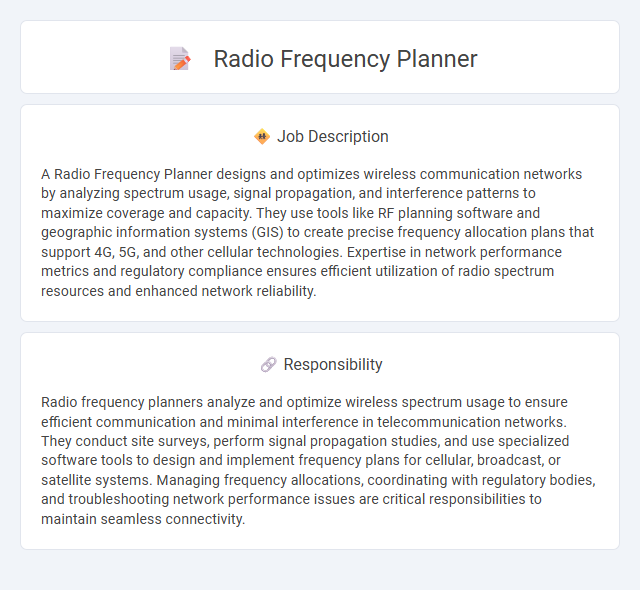
A Radio Frequency Planner designs and optimizes wireless communication networks by analyzing spectrum usage, signal propagation, and interference patterns to maximize coverage and capacity. They use tools like RF planning software and geographic information systems (GIS) to create precise frequency allocation plans that support 4G, 5G, and other cellular technologies. Expertise in network performance metrics and regulatory compliance ensures efficient utilization of radio spectrum resources and enhanced network reliability.
Individuals with strong analytical skills and a keen interest in wireless communication technologies are likely well-suited for a radio frequency planner role. Those who thrive in detail-oriented environments and can manage complex technical data may find this job fulfilling and manageable. However, candidates who prefer dynamic, less technical roles or struggle with prolonged concentration might not find this position as compatible with their strengths.
Qualification
A Radio Frequency Planner typically requires a bachelor's degree in telecommunications, electrical engineering, or a related field, with strong knowledge of RF propagation principles and network design. Proficiency in RF planning tools such as Atoll, TEMS, or Planet is essential to optimize signal coverage and capacity. Experience in cellular networks (4G/5G) and knowledge of spectrum management and frequency coordination enhance job performance and career prospects.
Responsibility
Radio frequency planners analyze and optimize wireless spectrum usage to ensure efficient communication and minimal interference in telecommunication networks. They conduct site surveys, perform signal propagation studies, and use specialized software tools to design and implement frequency plans for cellular, broadcast, or satellite systems. Managing frequency allocations, coordinating with regulatory bodies, and troubleshooting network performance issues are critical responsibilities to maintain seamless connectivity.
Benefit
A Radio Frequency Planner likely provides significant benefits by optimizing network performance and coverage, which can enhance user experience and reduce operational costs for telecom companies. Their expertise in analyzing signal propagation and interference probably leads to more efficient resource allocation and improved service reliability. Companies may also benefit from reduced downtime and increased capacity, resulting in better overall network quality and customer satisfaction.
Challenge
Radio frequency planner roles often involve complex challenges related to optimizing signal coverage and minimizing interference within densely populated or topographically difficult areas. The probability of encountering technical constraints and regulatory limitations requires strong analytical skills and adaptability to develop effective frequency allocation strategies. Navigating these challenges successfully demands continuous learning and innovative problem-solving to ensure reliable communication networks.
Career Advancement
Radio frequency planners specialize in designing and optimizing wireless communication networks, leveraging expertise in signal propagation, spectrum management, and interference analysis. Career advancement opportunities include senior RF planner roles, network optimization manager positions, and transitioning into 5G or emerging technology project leadership. Continuous skill development in advanced modeling tools and staying updated on regulatory changes significantly enhances professional growth and earning potential.
 kuljobs.com
kuljobs.com